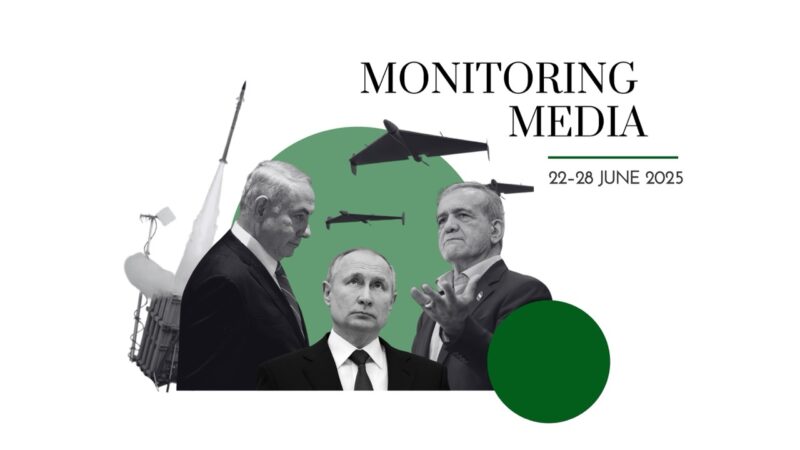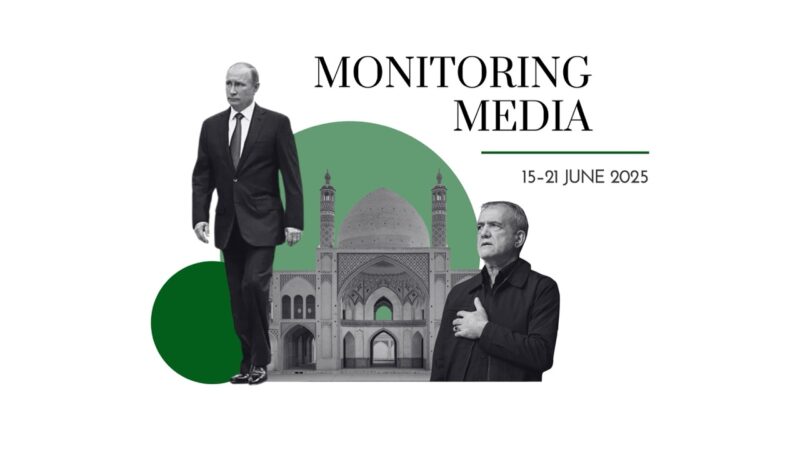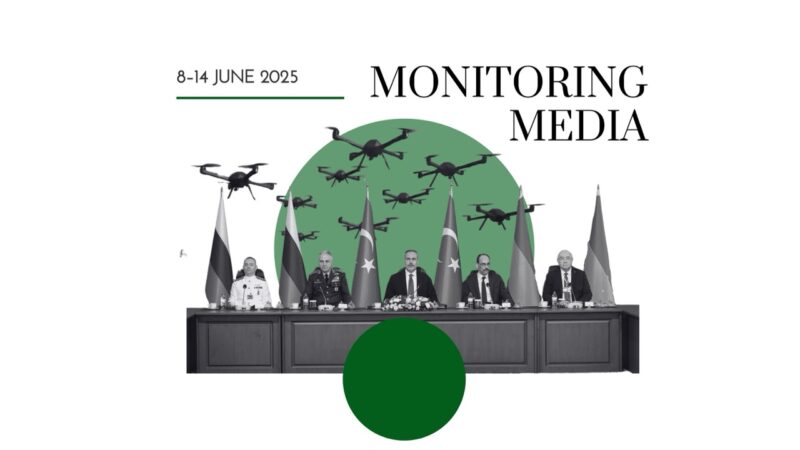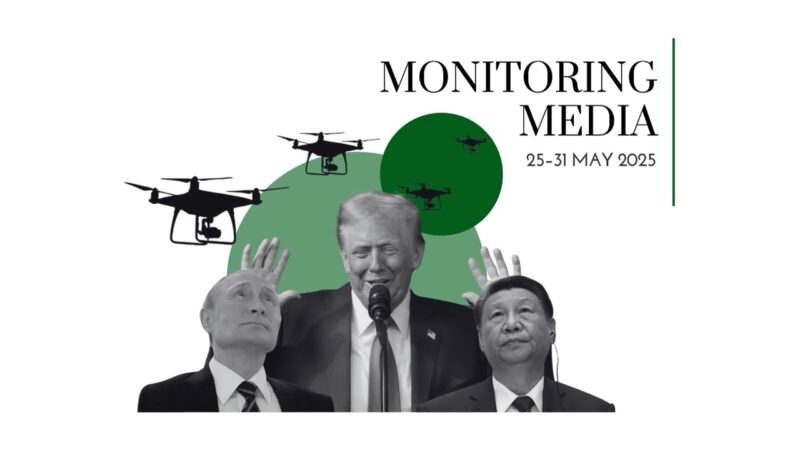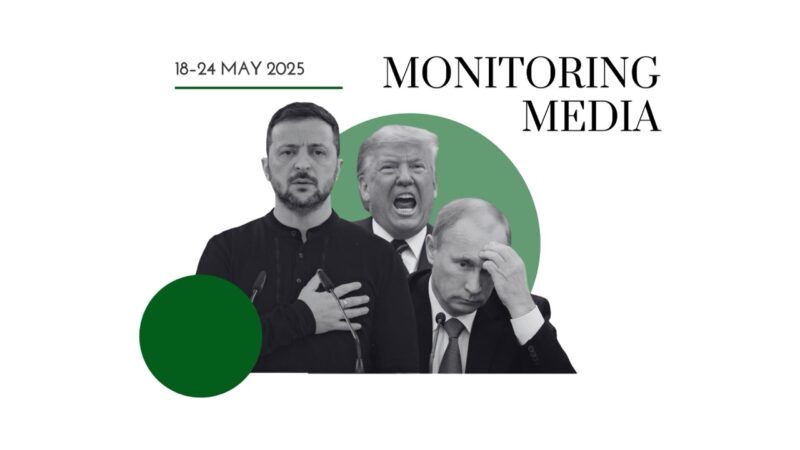US midterm elections carry the risk of weakening Western commitment to Ukraine

CIUS weekly report on media coverage of Ukrainian affairs, 5–11 November 2022
Three publications (Foreign Policy, Foreign Affairs, and Politico) were selected to prepare this report on how the situation in Ukraine has been portrayed in the press during the past week (5–11 November 2022). The sample was compiled based on their impact on public opinion as well as on their professional reputation, popularity among the readership, and topical relevance. These three publications represent centrist and liberal viewpoints on the political spectrum.
This report covers only the most-read and relevant articles about Ukraine, as ranked by the respective publications themselves in the past week. Its scope covers promoted articles on home pages and articles from special sections on Ukraine, with the hashtag #Ukraine, from the paper editions of the publications, and about Ukraine from opinion columns and editorials.
Topics featured in the selected articles:
- Ukraine’s current affairs: Ukraine’s army has liberated a large swath of its territory in the south and handed Russians a major defeat; Ukraine needs Western investments, technology, and weaponry to survive the coming winter; Ukraine requires Russia meet its conditions before peace negotiations can commence;
- The world and Ukraine: Republican triumph in the US midterm elections could weaken Washington’s support to Ukraine; US activating its European policy to secure unity of the Western front against Russia; Western components have been found in recent samples of Russia’s new military equipment;
- Russia at war: Kremlin will likely not resort to nuclear weapons in Ukraine, as such a move would be utterly unreasonable; Putin’s regime embraces many notorious features of Stalin’s regime from the 1950s.
The most common arguments:
Ukrainian army gradually and steadily liberates Kherson oblast. Jack Detsch (Foreign Policy) writes that under Ukraine’s pressure “Russian troops [have to] retreat from the west bank of the Dnipro River and give up the provincial capital of Kherson, the one regional capital they’d managed to capture in nearly nine months of fighting.” Ukraine’s gradual attrition of Russia’s front lines in the southern theatre not only put paid to Putin’s plans of “never surrendering” this terrain but also increased Kyiv’s hopes for new deliveries of US support following the recent midterm elections. Detsch highlights that the highly determined offensive of Ukrainian troops, reinforced by effective strikes using Western artillery, led to the encirclement of a large number of Russian troops in Kherson. The situation of the besieged looked dire, as they would need to cross the Dnipro fast, in high numbers, under shelling, in low temperatures, and with heavy equipment. These challenges clearly belie Russia’s self-delusional propaganda that it is any kind of a superpower. Nevertheless, if the Russians manage to withdraw as planned, the Dnipro will become a natural obstacle for Ukrainians to continue their counteroffensive. That being said, by liberating the western part of Kherson, Ukrainians will establish artillery control over the Russian supply lines from Crimea. They will also be in a much stronger negotiation position with the Kremlin.
Ukraine forcing the Russian withdrawal from Kherson may go down as the major defeat of the invading army in this war. Christina Lu (Foreign Policy) states that whichever side controls Kherson will invariably set the tone and decisively influence further strategic developments on the battlefield. At this moment, the Russian army has failed “to rebuff advancing Ukrainian troops who had largely encircled” Kherson, the only provincial capital that it managed to conquer in nine months (not counting Donetsk and Luhansk, which were occupied in 2014). Russia’s withdrawal from the city, officially announced by Defense Minister Sergei Shoigu, signifies a major setback that will further erode the morale of the retreating army, not to mention help Ukrainians rearm themselves with abandoned weaponry. Several Russian military bloggers have already branded the withdrawal as the most serious military defeat of their state since 1991. This defeat was made possible to a great extent by Ukraine’s unceasing pressure on Russia’s fortified positions and regular disruptions of the invader’s supply routes. For Ukraine, Russia’s withdrawal from Kherson could encourage greater international support, particularly from the US. Some experts conjecture that Russia’s withdrawal may be a ruse to lure Ukrainians into a booby-trapped city, but the Institute for the Study of War finds this scenario unlikely.
Ukraine needs Western support in defending its energy infrastructure to survive the coming winter. In light of the considerable destruction of Ukraine’s national infrastructure, Melinda Haring and Jacob Heilbrunn (Foreign Affairs) raise the question of whether Ukrainians will be able to live through the winter in relative safety and comfort. As things stand now, it will be hard to accomplish, considering that more than one million Ukrainians are living without electricity and “nine of ten Ukrainians [could] be impoverished by Christmas.” Haring and Heilbrunn argue that “today, as Russian President Vladimir Putin seeks to subjugate Ukraine, the West is facing a new Berlin blockade moment, and it should channel the same determination to prevent Putin from destroying Ukraine that it mustered with the Berlin airlift.” To make this possible, Western partners should support the fighting state with additional financial assistance, equipment to restore power and heat, and air defence systems. The money is needed to mitigate economic shocks, support the functioning of strategic enterprises, and cover budget deficits. That being said, internal tensions in the US and the EU may impact the volumes of Western financial support to Ukraine, or even put it on hold. To boost Ukraine’s infrastructural resilience, the West should help to repair the national electrical grid: send technical parts (transformers and cables) to bring power generation stations back and simultaneously encourage American and European technology companies to prioritize orders from Ukraine. Haring and Heilbrunn also consider that “the best way to protect Ukraine’s energy systems and its civilian population is to send air defense systems.” At the very end, Haring and Heilbrunn write that “for Washington and its allies, however, failure in Ukraine would simply mean confronting [Russia] again on another European battlefield. The faster the West aids Ukraine, the more quickly it can stymie Putin’s ambitions.”
Jack Detsch (Foreign Policy) supports the above arguments of Haring and Heilbrunn and states that “Ukraine needs heaters as much as HIMARS.” Having destroyed around 40 per cent of Ukraine’s power plants, Russia “left millions of people without water, sewage, and hot food, including children and the elderly.” With regular interruptions in electricity supply, many businesses in big cities have started panicking, considering relocation to safer places, and facing having to fire hundreds of employees, while the government fears that the national economy may shrink by one-third. Detsch argues that “Ukraine still has the ability to generate enough electricity to meet people’s needs, because demand has dropped dramatically since Russia’s full-scale invasion in February. But Russia’s campaign of strikes has decimated Ukraine’s ability to transfer high-voltage power that runs through power lines to lower voltages that can be used by consumers.” To restore the circulation of electricity in its national grids, Ukraine is in dire need of transformers. And even before electricity supply gets restored, Ukraine needs “boilers and stoves” now to “heat destroyed rooms, homes, and school gymnasiums, where internally displaced people have been forced to hide from Russian bombings.” The good news is that Ukraine’s partners in the West are aware of those needs and are working to satisfy them.
Ukraine revises its conditions for negotiating peace with Russia. Alexander Ward (Politico) highlights that in his recent speeches President Zelensky concedes the prospect of peace negotiations with the current authorities in the Kremlin, which is a noticeable departure from Ukraine’s earlier condition that Putin has to be ousted before any talks could start. Ward speculates that this change came at the recommendation of Washington: “U.S. officials didn’t directly tell Ukrainian President Volodymyr Zelensky and his aides to alter their position…but did relay that Kyiv must show its willingness to end the war reasonably and peacefully.” Zelensky’s cautious openness to peace negotiations should send a message to the world that it is Ukraine, not Russia, who speaks against aggression and wants the war to end. That being said, Zelensky staunchly defends other conditions for negotiations to commence, such as restoration of Ukraine’s territorial integrity, punishment of war crimes, and Russia’s payment of reparations. With respect to these conditions, according to Ward, there is no pressure from Washington. Ward cites Kurt Volker, special representative for Ukraine in the Trump administration: “Ukraine needs to be decisively winning on the ground, retaking its territory—and the U.S. should be trying to help the Ukrainians do that as quickly as possible.” Ward also highlights the fact that Zelensky’s new position was announced mere days before the US midterm elections, in which the Republicans might have gained a few important victories and increased their influence on US foreign policy.
Matt Berg (Politico) expands on what Ward delivered in his article and writes that “President Joe Biden vowed not to try to dictate any talks between Russia and Ukraine as the dueling countries approach winter, saying that both sides will ‘lick their wounds’ and decide whether they’ll compromise to end the war.” Biden also expressed confidence that even if the Republicans strengthen their presence in the parliament, bi-partisan support for Ukraine will continue.
A Republican triumph in the midterm elections could diminish US support for Ukraine. Robbie Gramer (Foreign Policy) writes about last-minute midterm election pitches in Virginia’s Seventh District. Gramer compares the foreign policy objectives of local Democrat and Republican candidates who are “neck-and-neck” on the eve of election day with respect to supporting Ukraine. In the example of Virginia’s district, Gramer predicts minor or major changes to the national foreign policy because the “district is widely viewed as a harbinger for how well or poorly Democrats will fare in the midterms across the country.” According to Gramer, if the Republicans take control of either the House of Representatives or Senate (or both) after these midterms, they will be able to “throw wrenches into Biden’s foreign-policy agenda with increased oversight, investigations, and scrutiny on issues like U.S. support for the war in Ukraine, bogged-down efforts to revive an Iran nuclear deal, the U.S. withdrawal from Afghanistan, and the country’s climate change policies.” Republican success may have little initial effect on US support for Ukraine; however, with the possible strengthening of the Trump wing among the lawmakers and growing concern among Republican voters about over-investing in Ukraine, things may change with time. Gramer also highlights the latent impact of social dissatisfaction with how the Biden administration managed the US withdrawal from Afghanistan, which amplifies the nationwide question of how deeply the US should engage in supporting Ukraine today.
US races to secure high levels of EU support for Ukraine. Erin Banco and Paul McLeary (Politico) write that the Biden administration started receiving warnings from US representatives in the EU about growing fatigue from the Russo-Ukrainian war. Citizens of several European countries are not happy with the high inflation and rising costs, which they link to the US-promoted policy of sanctions against Russia. In turn, “Washington increasingly believes that a consistent and unified messaging campaign with Europe is critical to success in Ukraine and that any fracturing of support for Kyiv could give Russia leverage both on and off the battlefield.” If the European fatigue is not addressed in the nearest future, it may lead to a new trans-Atlantic split, aggravated by the energy deficits in the EU that US citizens are not subject to. Banco and McLeary highlight that “the Kremlin’s decision to halt energy shipments due to sanctions has caused many European capitals to shift their attention from supporting Ukraine’s military to ‘dealing with the energy crisis.’” To this one should add needing to deal with post-pandemic complications in the EU and growing concern over Putin’s nuclear blackmailing. Banco and McLeary argue that to mitigate the fatigue in Europe, Washington should intensify communication with EU capitals, work on enhancing NATO unity, and promise flexibility in peace talks with the Kremlin when the time comes.
Western technologies can still be found in Russia’s newest advanced weaponry. Austin Wright (Foreign Policy) highlights that despite sanctions the Russian military industry is continuing to receive Western-made components to produce their advanced systems: “One transport aircraft alone requires more than 80 components that cannot be reproduced or created in Russia. This trend extends to Russian ballistic and cruise missiles as well as its drone technologies.” To address this problem and prevent Russia’s further militarization, Western states must re-examine their export control standards for dual-use parts. In particular, the US and EU need to strengthen supervisory, regulatory, and prohibition mechanisms that have been in place since 9/11. Wright believes that “the export control systems of Western states remain bogged down by coordination problems and competing strategic interests.” Since 2014, regardless of their declarations of support for Ukraine, certain state, non-state, and profit-oriented actors in the West have invented numerous ways of conducting business with Russia, bypassing sanctions. Wright also mentions that “dual-use components are one of the most complicated items in the strategic trade field.” For instance, gyroscopes can become part of both dental drills and missile navigation systems. Wright concludes that “effective export controls are complicated, and there are risk trade-offs that must be evaluated when engaging in business abroad. But the invasion has revealed clear gaps—and they need to be filled.”
The Kremlin will not deploy weapons of mass destruction as it is utterly unreasonable. In light of growing concern over Russia’s propensity to resort to a major military gamble, Dan Reiter (Foreign Affairs) puts forward the reassuring observation that even the most desperate leaders tend to avoid catastrophic actions: “Putin, like other leaders before him, will take into account whether his actions might actually help him win, and he may be reluctant to contemplate moves that could expose Russia to even greater losses or, worse, undermine his rule at home.” Reiter describes a few major military gambles in history, both successful and unsuccessful, to highlight that a leader’s probability of resorting to something utterly destructive depends on two convictions: first, that the risky move will bring victory and, second, that all the conventional moves have already been tried with no effect. “This does not mean that leaders stay away from all nasty behavior, but there are some places they are unwilling to go, even in desperate times.” Reiter argues that the deployment of weapons of mass destruction is counterproductive and unreasonable for the Kremlin, as it will neither critically weaken the Ukrainian army nor change the tides of the war. Apart from this, Ukraine presents no clear targets for a nuclear strike—which may, in turn, trigger a very bold and humiliating response from NATO. Reiter concludes that “Western leaders should continue their current course of action, which is to provide a steady supply of military aid to Ukraine, seek ways to isolate Russian diplomatically and economically, and keep NATO troops out of combat, knowing that this course allows Ukraine to fight, survive, and make headway without creating significant risks that the West’s worst fears might come true.”
Russia’s current political regime resembles 1950s USSR. Andrei Kolesnikov (Foreign Affairs) argues that Vladimir Putin has entered the “Stalin phase” of his reign: “The harsher and more repressive the regime of Russian President Vladimir Putin becomes, the more successful the reign of Joseph Stalin appears to ordinary Russians.” This regime transformation has nurtured Putin’s paranoia, led to his isolation, and made him believe that constantly raising the stakes both internationally and at home is the correct way to govern, as proven by the USSR experience. Kolesnikov states that “in 2022, Russia has turned into a full-fledged, personal autocracy. In his embrace of imperial and nationalist ideology, his ruthless crackdown on civil society and any form of dissent, and his call to arms of almost the entire country, Putin has reabsorbed nearly all the classical elements of Stalinist totalitarianism, from the cult of personality to the cult of heroic death.” The biggest part of Kolesnikov’s article is dedicated to pinpointing similarities between Putin’s and Stalin’s regimes: both leaders usurp all national decision-making, distrust their environment and harass elites, use military force to solve political problems, engage in lasting conflicts (that can only be resolved after their death), divide the world into spheres of influence, falsify history and national remembrance on a large scale, sever connections with the West, and fail to create a mechanism for power transfer.
